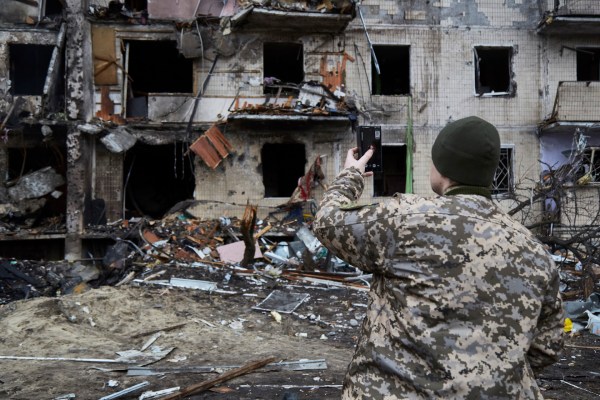Ukraine deputy minister talks IT Army and deploying $25M in donated crypto – TechCrunch
As the situation continues to unfold in Ukraine with alarming developments, the country has been putting up a resistance to Russia beyond the ground war: It’s been taking the fight to the digital front, leveraging the internet to fight against Russia’s attacks, to proactively go after Russia’s halls of power and to corral support — including financial support — from those who want to do something to help out.
Russia’s decision to switch from constant, menacing side-presence to full-scale attack may have caught some by surprise, but that was not the case for those who were already aware of the early warning signs.
“The war didn’t start four days ago,” Oleksandr (Alex) Bornyakov, the country’s deputy minister for Information Transformation, said in an interview on Tuesday. “It’s been going on for eight years. Russia was attacking us all of those years.”
The country’s proactive digital campaign is already starting to pay some sizable dividends. As of yesterday, Bornyakov said, $100 million had been raised through various online donations from around the world. Of that amount, a full $25 million had come from cryptocurrency donations to accounts co-managed by Ukraine officials and those operating the networks in public-private partnership. Over half of that amount has, in turn, already been spent on supplies to help the Ukrainian resistance.
Bornyakov has been working on the front lines of the country’s digital strategy for some time.
Before last week, that meant things like running the country’s Diia City initiative, a massive plan to encourage more foreign tech companies to come to Ukraine to build operations, and to encourage more startups to grow in the Ukrainian ecosystem, sweetening the deal with big tax breaks and other incentives.
As of this week, the job is more about managing the country’s big leap into raising money through cryptocurrency to support its resistance efforts, managing and interfacing with other digital activist grassroots efforts and thinking about contingency plans for communication as the fighting intensifies.
The developments are coming thick and fast in each area. As I interviewed him yesterday, news was breaking about the Russians bombing a television tower; tech companies continued to announce more blockages of content and services; and more people were fleeing, fighting and getting caught in the crossfire.
Bornyakov himself confirmed he was still in Ukraine and safe, but declined to disclose his exact location, and his assistant who helped arrange the interview did so from a separate location, a bomb shelter. We also had to try a couple of different communication channels before finding one that would work. How long any of those will remain constant is a big unknown. We’re all hoping for an end to this, and for Ukraine to come out of it independent and stronger.
At a time when things are rapidly developing, we caught up with Bornyakov to give us a snapshot of things as they stand right now across some of the bigger digital developments, including the rise of the so-called IT Army; Ukraine’s cybersecurity; and the cryptocurrency bet that Ukraine is taking. The bigger picture is one of bracing for what will come around the corner but also one of keeping calm, carrying on and maybe even flourishing under pressure. Below is a transcript of that interview and conversation, which we’ve lightly edited for length and clarity.
TC: Thank you so much for taking some time to talk to me. I know it’s a very chaotic situation there right now. First of all, where are you calling me from? Are you still in Kyiv or somewhere else?
Oleksandr Bornyakov: I’m in Ukraine, but not in Kyiv. This is really tough, and so far we are safe. But a lot of people from Ukraine are not.
Understood. I’ll get to my questions. What’s been fascinating has been the digital dimension of your resistance efforts. If we can start with some questions on the IT Army, a grassroots, crowdsourced group of hackers that are taking down lots of Russian sites and wreaking havoc. Federov endorsed it, promoted it on Twitter. It’s got about 260,000 members now (edit: now 270,000+) in its Telegram group. What connection does it have to the government?
They are volunteers just returning the call of the minister. We don’t know them really. And there are no, like, leaders doing coordination on personnel level. It’s just a huge group of people. And I think there are not just individuals there. There are also organizations. Even the Russians said that the power [the IT Army] has is equal to what only three countries in this world have — the USA, China and Russia. So their combined efforts are equal to the biggest state cyber defense groups.
You mean in terms of how much they’ve been taking down?
Yeah, how much harm they can do.
Do you coordinate anything with them in terms of where they’re targeting their energies?
We don’t communicate on the person-to-person level with any one specific person or group, we just put a task into a room, and they execute it. Just a couple of minutes after, some infrastructures go down. Any infrastructure that we ask them to, they destroy it.
Have they been involved at all in the other side of what that means, which is securing things, given that Russia is trying to attack anything aligned with Ukraine’s interest in the most aggressive way right now, on the ground and in cyberspace.
The war didn’t start four days ago. It’s been going on for eight years. Russia was attacking us all of those years. I mean, on a cybersecurity level, on the internet. So, through those years, we developed a really advanced cyber defense system. So maybe — well, I know — they have been trying to attack us. But with no success. Cyberdefense is being taken care of by a different group of people. To defend, we need to give them access to restricted systems. We can’t give access to just anyone and the IT Army is a public group. It could be anyone. So the defense is completely on the shoulders of a different group of people.
Do you have a wider strategy for the IT Army?
Well, I can’t really talk about strategy since I know you will publish this. But I can give you sort of an answer. The thing is that we were under attack, for all these years, online. And we never fought back. We just defended ourselves. So this is, for the first time, us trying to show them how we feel when infrastructure is being attacked, when you can’t just use your cards or government services and everything. So so this is the answer.
Let me ask you something else about the IT Army and how they’re coordinating. What’s interesting to me is that it’s in their favor to be public and exposed, about showing their size and their impact. But there are other aspects to consider, such as the claims that Telegram is not so secure, claims it can be censored, and that Russia has control over it. How much of that is a concern for you?
Well, we actually use different messengers. But, Telegram is, like… [laughs] it’s a lot of Telegram use. But at the same time, we use almost all of the messaging apps, actually. I don’t have any preference. Other people from our team also communicate using different messaging apps. It’s gonna be really hard to take us down from this perspective.
What about other communications channels? How are they holding up?
The connections are working. There are no electronics impacted yet. They hit one of the stations but it’s just one in a big city. There are a lot of others. But I think they will try to disrupt connections. They didn’t do this in the first place because I think they thought that this would be faster and easier, they would just run through the city, stop in the main square and just celebrate. That’s why they didn’t touch any infrastructure in the first place. But then the Russians realized they are not welcome here. They are occupying territory. So after like almost a week, they started to destroy our infrastructure, hit civilian objectives, kill civilian people.
How does Elon Musk’s Starlink expansion fit into your communications plans?
Listen, I can’t give you like all the plans. But yeah, there are multiple levels of backups and… just plans, of course. And if we had no contingency plans, we would already be dead. You have no idea how many attacks they’ve tried to push on us in cyberspace. So yeah, our infrastructure is working and it’s fine. It’s not just a matter of hitting a server and it’s down.
Some of your international messaging has been really effective, very direct, in terms of how you have appealed to others to do their part in helping. One of the latest has been asking ICANN to “revoke permanently or temporarily” Russia’s top level country domain name, shutting down DNS, revoking TLS certificates, all of that. How plausible do you think that’s going to be? And have you heard back from them?
We haven’t heard back from ICANN. I’m not sure what actions they will take or should take. But I’m sure that if organizations, or people, share common humanitarian values, if you don’t stand up, it’s the world that will be impacted. It’s not going to stop here. Putin’s completely out of his mind. And he’s going to push harder. He’s pushing the limits, if you see what he’s been doing for the last decade. And I think he understands the language of power. So my position is that we just need to fight back as in, push as hard as we can. Otherwise, I don’t know, maybe it will eventually go as far as nuclear weapons. But his country has to feel that there are other ways to solve problems, not only war.
So you’re reaching out for international collaboration with some organizations and at a grassroots level. Are you also coordinating with, let’s say, the U.S. or any other, any other states in terms of cyberdefense?
I think there’s a lot of coordination.
[He separately gave a lot of credit to other countries, singling out the U.S. and U.K., for their support, but wouldn’t get into any specifics.]
Let me talk to you a little bit about cryptocurrency. Ukraine this past weekend tweeted out wallet addresses and it looks like millions in different currencies have poured in. Who’s actually running those wallets for, on behalf of, the Ukraine government?
Well, the fund that we manage is being run by a Ukrainian crypto exchange. So this is a partnership, like a public-private partnership. In order to make things faster, we just secured a partnership with one certain exchange. We need to be sure that monies are secured, so no one can reach them. And of course, we need fast exchange and fast transfers. So it’s not just government, but we have control over those accounts. Most of them multi-signature accounts. So if you want to use them, you have to get at least like three signatures of people. [Bornyakov is one of those signatories for some but not all of the accounts.]
Kuna is the exchange that you’re working with. So that is the relationship that you’ve secured with the crypto exchange, and they’re helping you convert crypto assets to fiat?
Yes. That is right. Mostly.
Got it. And which currencies are you guys working in and which fiat are you converting to?
We operate in mostly Bitcoin, Ethereum and Tether but we also got a huge donation of $5 million in Polkadot. A lot of people want to donate in other currencies, so we are know working on additional crypto wallets. For fiat, I think it is mostly U.S. dollar, and euro.
Have you been extracting the money yet? Or are you still waiting to use it?
Half of the money is already spent on some equipment — I can’t tell you what — and today we also had a huge purchase. We are spending it. We work with the Minister of Defense too, so it’s not just Kuna and us, it’s also the Ministry of Defense involved. So basically, we we understand the needs and they help us with logistics. Once this is finished, we are going to give a full transparency report to everyone. [Separately Kuna has told us that equipment purchases have included drones and other supplementary equipment.]
How much of the money has been spent so far? And how much has been raised so far?
About $25 million has been raised so far, and I think we have spent like $14 million.
Why did you guys choose to do crypto donations rather than some other some other non-crypto route? There are lots of fundraising routes out there.
Well, maybe you’re not aware of this, but National Bank of Ukraine ran the first huge national campaign earlier, before this, and specifically they are raising money mostly in fiat currencies and cards. So the work is being done in parallel. It’s not just crypto. There are a number of funds. Some of them are focused on the humanitarian aid, some of them just on military. Some are there to support government operations. So I don’t know, the combined effort of different institutions, I think, has raised $100 million.
This is probably more of a sidenote, but I wanted to ask about Diia City, the tech city project you were overseeing. I’m guessing it has taken a bit of a backseat at the moment.
At this point, yes, a backseat. We started relatively great. There were hundreds of companies, including huge enterprises, international companies going in, but unfortunately, the Russian invasion has killed this. Maybe we could say it’s been postponed. But right now, companies are just evacuating most of their personnel.
Some people are staying and helping with the effort from Ukraine, but so many have left. It’s just such a shame.
I agree. It’s just, it’s unbelievable, what’s happened. We never would have imagined such a tragedy on our territory. But we’re going to rebuild eventually. And of course, we think we can work this out. But it’s going to be very hard.





